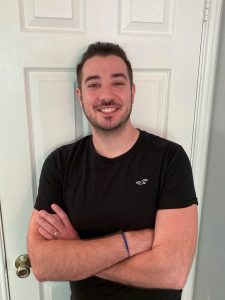Kemal Ozalp, a doctoral student in biology, is from Istanbul, Turkey, and received his bachelor’s degree from Yildiz Technical University and a master’s degree from Istanbul Technical University. He says he is planning for a career in which the university and private sectors figure prominently and his scientific discoveries can become products. “Even though the future is very unpredictable right now, my goal is unchanged.”

What made you choose UNC-Chapel Hill when deciding on a program/place to study?
I had visited the U.S. in September 2016 before I applied to grad schools. During my visit, I aimed to meet researchers that I wanted to work with. I met with around 10 researchers, both from the east and west coast. This way, I built a network of researchers and schools. This is how I contacted my current PI. UNC is a well-known school with a long history and traditions, which is a very positive thing from a grad student’s perspective. It means stability. After the application process, I met my colleagues online during the recruitment week and liked them. Then came research about the area that I was going to live within for five years. Actually, this is the hardest part because international students don’t have a chance to participate in the recruitment week physically. Therefore, we have very limited options to know the area.
I had some criteria. First, I wanted to live in a small place with no distractions. I wanted an easy life where there is no traffic, no lines, no chaos. The reason for that is I lived in Istanbul, Turkey, for 12 years prior to coming to Chapel Hill. Istanbul is a city with 16 million people. I was exhausted. My daily commute was around four hours. Of course, it was a bit of a culture shock when we first moved to Chapel Hill, especially for my wife who is an architect and loves cities. In addition to the simple life, the cost of living was an important factor since I was going to live there with my spouse. The cost of living is relatively cheap and quality is high in Chapel Hill compared to many places in the United States.
Tell us about your work.
I am interested in animal behavior and biological fluid dynamics. Currently, I am working on how plankton swimming changes throughout the development of the organism and how it interacts with its biological functions. We are also trying to understand the movement patterns of individual zooplankton and whether there are consequences on the animal’s biological functions and survival. Overall, plankton are crucial for aquatic and marine life in terms of being a food source for higher-level organisms, cycling carbon, and more. My research aims to help us better understand the interplay between the developmental changes and fluid dynamics, and the movement patterns of these tiny but mighty creatures.
What are some of your favorite places and things to do in your home country?
My favorite place in Turkey is Selimiye, which is a small town on the coast of the Aegean Sea where you can find every shade of the color blue and a sea like a giant aquarium. I guess I talk so passionately about it because I couldn’t visit my home country this year for known reasons. Please forgive me if this sounds like a travel ad, but I used to go there with my family and friends every year for a week to catch up and relax. The laidback life, amazing sea, the sun, friends and family, good food, and the getaway from all the responsibilities of life, at least for a week, helped me a lot to recharge and get back to work.
What are you hoping to accomplish with your Carolina degree?
I always wanted to position myself between the university and private sector because I want my scientific discoveries to turn into products. Even though the future is very unpredictable right now, my goal is unchanged.
